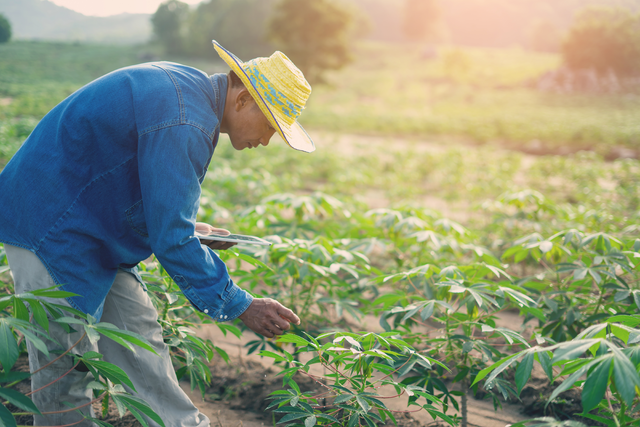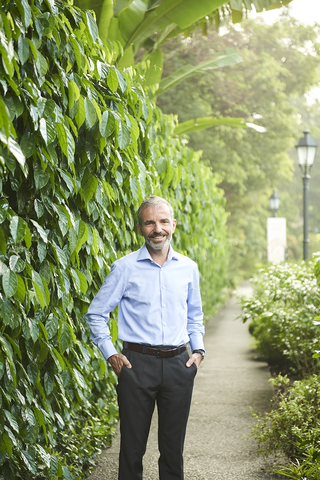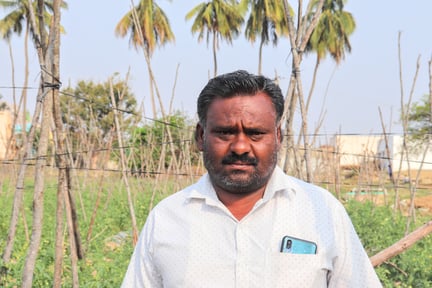How Access to Digital Technologies Can Help Smallholder Farmers

Resiliency is a top theme in 2021 as we continue in the era of COVID-19 and this applies even more to smallholder farmers. More than 500 million smallholder farmers produce roughly a third of the world’s food supply, and in developing countries, they produce a bit more than half of the calories consumed.
Smallholder farmers face daunting political, economic, social, cultural, and institutional barriers. They have limited access to information, markets, capital, land tenure, and even basic agri-inputs like fertilizers and seeds. COVID-19 has disrupted the agriculture industry and exposed the need to build more resilient food systems by ensuring farmers have access to both existing technologies and future innovations.
The farming industry is evolving and there is a need to accelerate digital transformation in agriculture.
Challenges facing smallholder farmers
Even before the COVID-19 pandemic, smallholder farmers faced daunting challenges despite being crucial to feeding millions of people, especially in developing countries. While they have immense impact potential, smallholder farmers often lack the resources needed to farm efficiently and sustainably, and to support their families and communities.
Agriculture and COVID-19
As a result of the COVID-19 pandemic, the world witnessed the most severe increase in global food insecurity in 2020. Venktesh is a smallholder farmer in Mulbagal, Karnataka, India who cultivates tomatoes, cabbage, and mangoes. As he explains, “The onset of the pandemic was very sudden. No country in the world was prepared for the pandemic or what came along with it.”
The COVID-19 pandemic has had a massive impact on smallholder farmers from supply shortages for seeds and fertilizers to financial losses as farmers could not sell their produce in local markets for the usual price.

As Jens Hartmann, Head of Commercial Operations Asia Pacific, Crop Science at Bayer points out, “COVID-19 has disrupted the agriculture industry and our food systems, and impacted smallholder farmers immensely.”
In an interview with Net Impact, Hartmann elaborates, “The pandemic has really highlighted the vulnerability of our food systems, and how we all need to take better care of smallholder farmers to ensure the resiliency of our food supply."
Digital technology is the way forward to increase resilience and protect the entire eco-system surrounding smallholder farming that has proven critical time and again to feed the world.
Digital technology as an enabler
Digital technology is transforming agriculture by increasing farmers’ crop productivity and farm profitability. It is also helping them by enabling knowledge sharing via digital agronomic advisory and mitigating risks from climate change and adverse weather impacts.
In today’s global landscape, smallholder farmers are increasingly reliant on digital tools. Venktesh explains, “We can plan our agricultural work based on weather forecasting apps. If we have any doubts regarding crop disease or crop-specific agronomic advice, we can click a photo and send it to the crop specialist and get our queries answered.”
Solutions during the COVID-19 pandemic
During the ongoing COVID-19 pandemic, access to new technologies is helping farmers meet food security needs by:
● Making informed decisions regarding planting, crop protection, and harvesting
● Increasing productivity and efficiency
● Filling gaps left by labor shortage / labor unavailability
● Allowing for easy, safe distancing practices
“Digital tools and solutions allow farmers access to the value chain, provide market information about commodity prices, and link them to offtakers who will buy their harvest at fair prices, while also connecting them to financial institutions for their credit and financing needs,” explains Hartmann.
Venktesh says he was recently able to attend a meeting virtually with the GoToMeeting app on the topic of Velum Prime, a nematicide product from Bayer’s insecticide portfolio. “I applied the advice and products shared in the meeting to my fields and it was a huge benefit.”
Hartmann describes how his teams at Bayer helped smallholder farmers directly during the pandemic, “Our teams went out to the fields and supported in different ways, whether through basic measures such as providing sanitizers at agri-retail shops or distributing care packages consisting of crop protection products and seeds to help farmers kick-start their planting season.” Hartmann also acknowledges the contributions from like-minded players in the industry and local governments, “We must work together across the public and private sectors, and along the value chain to make sure we are addressing smallholder farmers’ needs. It’s not something that an individual company or an individual player can take on, this requires a collective effort across the Ag industry.”
Technologies shaping the future of agriculture
Bayer is shaping agriculture through innovation.
“The most important thing is that you must build trust. That is not something you build overnight, but over time. Trust is built by being humble, giving the best advice for their livelihoods and for their farming operations.” - Jens Hartmann, Head of Commercial Operations Asia Pacific, Crop Science, Bayer
Current projects from Bayer include:
● Better Life Farming is a global multi-stakeholder alliance that is currently operational in three countries India, Bangladesh, and Indonesia. Through global partners such as Bayer, IFC & Netafim, and local partners, the Better Life Farming alliance aims to increase the crop productivity and farm profitability of smallholder farmers. It also aims to strengthen the livelihoods of farming communities through rural job creation and promoting agri-entrepreneurship via the Better Life Farming centers.
● FarmRise™ is a digital advisory platform that provides agronomic information and advice to smallholder farmers in rural India, helping them make informed strategic decisions to ensure a sustainable and resilient food supply chain.
Farmers around the globe can meet the demands of a growing population, adverse weather conditions, and mounting food insecurity.
Looking to the Future
As described by Hartmann, “Smallholder farmers are probably one of the most entrepreneurial groups when it comes to their profession. They work for generations in the field, and they pass on wisdom and knowledge to the younger generations.”
Bayer is committed to supporting smallholder farmers and encouraging innovation and growth in the industry for future generations. “We are building digital interventions to improve the work of the farmer and to also make agriculture more attractive to younger generations,” explains Hartmann.
“We hold a bi-annual conference, the Youth Ag Summit, where we invite young students aged 18 to 25 years, to come and discuss their ideas on feeding the world’s growing population,” says Hartmann. “The event has helped us engage with the younger generation and co-create strategies on critical topics such as growing enough food, reducing food wastage and protecting natural resources.”
When asked how Bayer hopes to address the immediate issues of today while maintaining a focus on future challenges, Hartmann believes that companies must “boldly commit to sustainability targets.”
This is why Bayer has defined clear sustainability targets that the company aims to achieve by 2030, in line with the United Nations’ Sustainable Development Goals (SDGs), namely:
- To help 100 million smallholder farmers in low- and middle-income countries (LMIC) to produce enough quality food for themselves and others;
- To enable 100 million people in underserved communities to access everyday health; and
- To provide 100 million women in low- and middle-income countries with access to modern contraception.
Climate change innovation
A big opportunity for the future of agriculture is to use digital technology to adapt to challenges associated with climate change while also finding ways to reduce the environmental impact of the industry. Venktesh says, “With digital technology, we have been able to predict changes in weather, do better forecasting, and adopt climate-smart practices.” Hartmann elaborates on the potential of digital technology, “Technology such as drones, satellite, and predictive analytics can lead to a situation where you don’t necessarily have to spray pesticides on a rice field, but you can do targeted applications where problems arise, addressing the economic challenges and also reducing the environmental impact.”
At Net Impact, we are thankful for our partnership with Bayer. We recognize that meaningful and lasting change can only be achieved when institutions and society work together around a common goal. As Hartmann says,
“It will take partnerships with like-minded companies, innovation ecosystems, and strong collaborations with governments to crack the code to really address the major societal challenges that we are dealing with, whether that is food insecurity, food production, generational challenges, or a global pandemic.”





